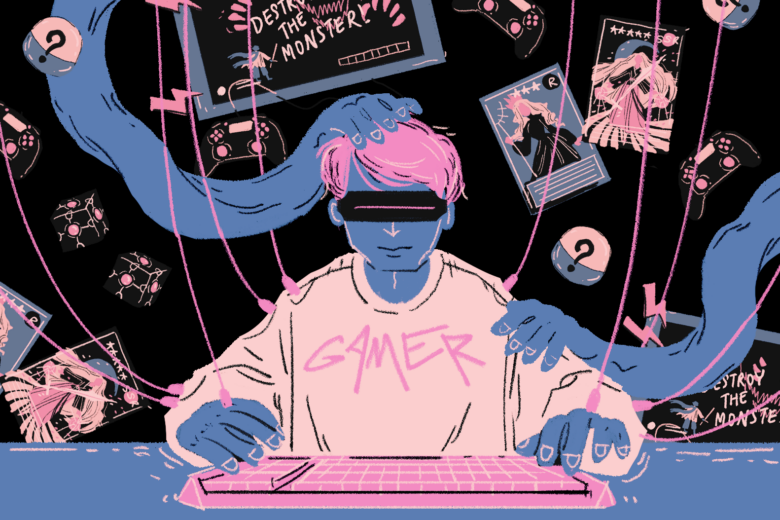Game addiction, also known as gaming disorder, refers to a condition where an individual is severely engaged in gaming activities that interfere with their daily life. Gaming disorder is identified by an impairment of the individual’s ability to function in various aspects of life, including relationships and occupation. It is characterized by an intense preoccupation with gaming activities, such as playing video games or using electronic devices; spending excessive time on these activities; neglecting social activities and responsibilities; and discontinuing this behavior despite facing negative consequences.
There are many free online games that can be relaxing and enjoyable, but they can also become addictive if you play them excessively. And the reason behind these addictions is that they can stimulate the release of dopamine, a neurotransmitter that regulates the brain’s reward and pleasure centers, making players feel good and encouraging them to continue playing.
Online games also provide social interaction and a temporary escape from reality, which can be appealing to people experiencing stress, anxiety, or depression. Additionally, many games use “Skinner box” mechanics, which involve intermittent rewards that encourage continued play in the hopes of achieving the next reward. However, excessive play can lead to negative consequences, including addiction, social isolation, and neglect of other important areas of life.
Having said that, it is important to recognize the initiation of the addiction and the pattern of your behavior so you can timely help yourself from being addicted. And here are some ways to do that.
Contents
Signs and Symptoms of Game Addiction

Source: manhattanpsychologygroup.com
Game addiction may not have been officially classified yet as an addiction, but it does show similar signs and symptoms that are associated with other addictions.
The following are some of the most common behaviors associated with game addiction:
- Inability to control one’s gaming habits – An inability to stop playing a particular game even when you know it’s taking up way too much of your time or causing you distress.
- Preoccupation with gaming – Spending an excessive amount of time thinking about the game, talking about it, or planning when to play next.
- Loss of interest in other activities – Loss of interest in activities that you used to enjoy doing such as playing sports, socializing, going out, etc.
- Increasing tolerance – A need for longer gaming sessions or higher levels of difficulty in order to achieve the same level of satisfaction.
- Neglecting relationships – Neglecting family and friends who used to be important in your life because all your free time is spent on gaming.
- Feeling unhappy and irritable when not playing – Feeling anxious, depressed, agitated or irritable if not able to play games for some reason.
Method To Prevent Game Addiction

Source: thirst.sg
- Set time limits: setting a time limit sounds easy yet can confuse you instantly if you don’t plan the activity. Here are some tips and examples on how to set time limits for playing games:
- Use a timer: Set a timer for a specific amount of time, such as 30 minutes or an hour, and play games until the timer goes off. This can help you stay aware of how much time you are spending on gaming and make it easier to stop when the time is up.
- Plan your day: Plan your day in advance and allocate specific times for playing games. For example, you could schedule one hour of gaming time in the evening after completing other tasks and responsibilities.
- Keep a gaming log: Keep a record of how much time you spend playing games each day or week. This can help you identify patterns and make adjustments as needed.
- Use parental controls: If you are a parent, use parental controls to limit the amount of time your children spend playing games. This can help prevent excessive gaming and promote healthy habits.
- Find alternative activities: Instead of spending all your free time on gaming, find alternative activities that you enjoy or that are important to you. This could include hobbies, exercise, socializing with friends, or spending time with family.
- Monitor your mood: Do you know this smart move can even help you build a new hobby? Wondering how? Well, Here are some tips on how to monitor your mood while playing
- Keep a journal: Write down how you feel before, during, and after playing games. Take note of any changes in your mood, such as increased stress or anxiety, irritability, or feelings of sadness or loneliness.
- Check-in with yourself: Take breaks during gameplay to check in with how you’re feeling. Ask yourself questions like “Am I feeling stressed right now?” or “Am I losing track of time?” to stay aware of your emotional state.
- Observe your behavior: Pay attention to how you behave while playing games. Are you becoming more aggressive or impatient? Are you neglecting other important tasks or responsibilities? These may be signs that you need to cut back on gaming.
- Seek feedback from others: Ask friends or family members for feedback on how you’re acting while playing games. They may be able to provide insight into your mood or behavior that you may not be aware of.
- Prioritize other activities: Make sure that playing games does not interfere with other important aspects of your life, such as work, school, family, or social relationships. Set aside time for other activities that you enjoy or that are important to you.
- Seek support: If you find that you are struggling to control your gaming habits, seek support from friends, family, or a mental health professional. They can help you develop healthy habits and coping strategies to prevent addiction.
Seeking Professional Help

Source: forbes.com
There are several types of therapy available for patients who want to break their game addiction:
– Cognitive Behavioral Therapy (CBT): CBT is based on the idea that our thoughts create our feelings and behavior patterns and work to challenge irrational thoughts while teaching better coping skills
– Motivational Interviewing: This type of therapy helps people struggling with many different types of addictions, including gaming addiction by helping them understand why they may have developed the addiction in the first place
– Dialectical Behavior Therapy (DBT): DBT is a psychological treatment that has been proven effective at treating issues like mood swings, impulsivity, drug abuse, and game addiction. It teaches clients how to accept their condition and provides tools for changing the behavior associated with it.
Conclusion
With all the interesting tips available, we can conclude that though online games are addictive, yet, it can be played in a healthy manner without fear of addiction.
